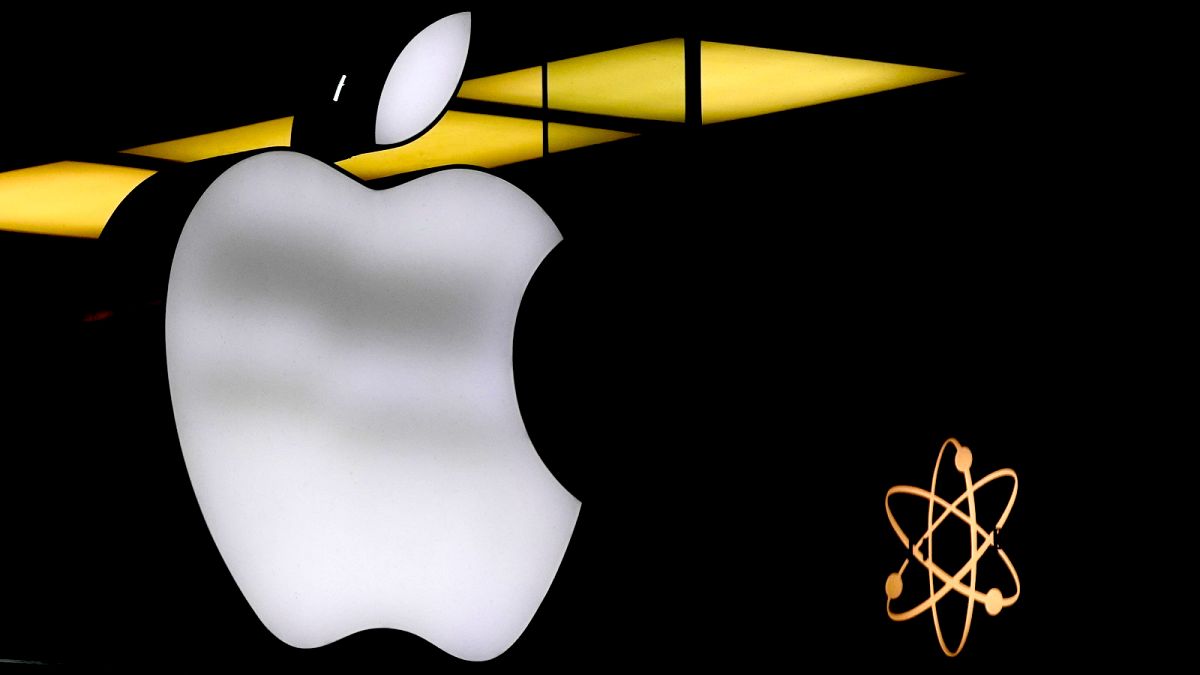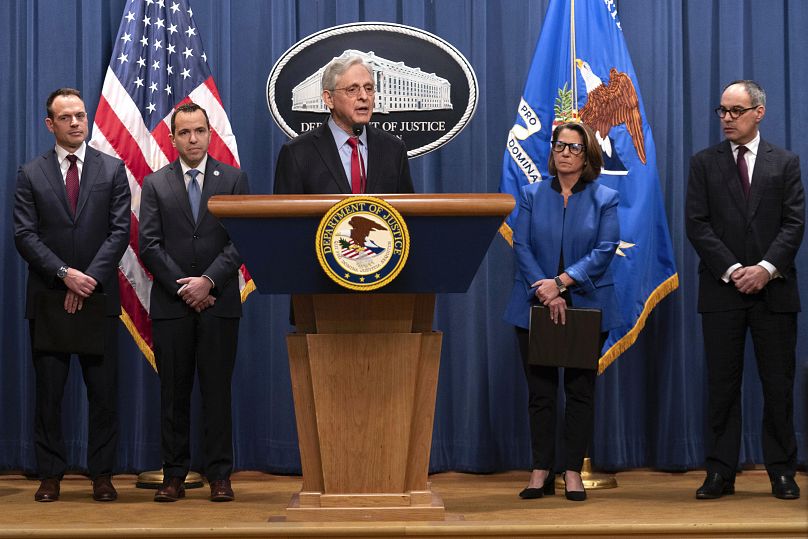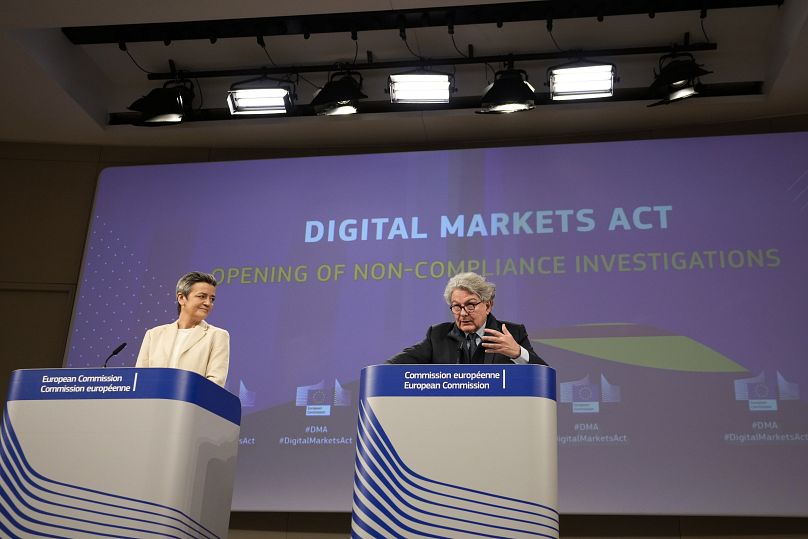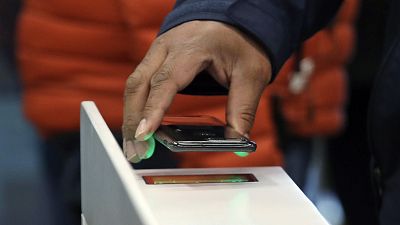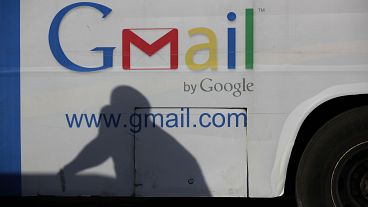Experts say Apple’s “religion” of being closed off is under threat due to the dual pressures of antitrust lawsuits and the full force of new regulations.
Between a new investigation in Europe and a major antitrust lawsuit in the US, Apple faces rising pressure from regulators over anti-competitive business practices.
But there are wide differences between the latest EU rules and the lawsuit brought in the US.
Here’s a look at the most recent developments and what is at stake for Big Tech.
‘EU has to defend its programme’
Many of the recent changes come down to sweeping new EU rules that forced the largest tech companies to alter their apps and services for the European market.
One of those new regulations is the Digital Markets Act (DMA), which officially entered into force for the six companies that were designated “gatekeepers” earlier this month.
The rules forced Amazon, Apple, Google’s parent company Alphabet, Meta, Microsoft, and TikTok’s owner ByteDance to make changes such as allowing users to choose a default search engine and uninstall certain features.
This week, EU regulators announced they were opening investigations into Apple, Google, and Meta over their compliance with this new regulation just two weeks after the companies were expected to make changes.
One aspect is looking to determine if Apple allows consumers to access offers outside of the App Store as required by the DMA. The other is related to Apple allowing users to pick different browsers or search engines on iPhones.
“The EU really does have to defend its programme. It does have to get off on a good foot and not let the gatekeepers weasel out of obligations by manipulating, by saying, okay, I won't do this, but I'll do that,” Eleanor Fox, professor emerita of trade regulation at the New York University (NYU) School of Law, told Euronews Next.
“That's what the EU is trying to do from day one, to make sure that the companies are really following the prohibitions and the obligations,” she added.
How does the recent US lawsuit compare to the EU regulation?
The compliance investigations come days after the US announced a landmark antitrust case that accuses Apple of monopolising the smartphone market by making people dependent on its products.
Some of the anticompetitive practices noted in the US case are also covered by the DMA, such as Apple’s prohibition of “alternative app stores” and limiting third-party apps from offering tap-to-pay.
Damien Geradin, a founding partner of a law firm specialising in competition law in Brussels, represents some tech companies that aim to provide new app stores that have found it difficult to compete with Apple.
“I think that the US is looking at things from a different angle. Of course, there's some overlap between what they're trying to do and what the DMA is trying to do. But at the same time, the DMA is very prescriptive,” said Geradin.
“There are a number of very precise rules [dos and don’ts]. Whereas, the US case, because it's antitrust, is looking at things from a broader perspective,” he explained.
While the US lawsuit is a sweeping criticism of Apple’s monopoly in the market, NYU’s Fox says that what the US can get from the company is very different compared to the changes being forced upon it by the EU.
“In some remote way, they're trying to get at the same thing,” she said, adding however that when you look at what’s “realistically possible” for the US government to win in the case, it’s not similar.
“For example, although the Justice Department in the antitrust case does talk about Apple charging monopoly prices, it's not illegal in the United States to charge a monopoly price,” Fox explained.
“So what the Justice Department is doing is trying to prove a lot of bad conduct that protects Apple, builds the moat so big and strong that if you get rid of the moat, the competition will drive the price down,” she said, emphasising that US law wants to drive the price down rather than regulate it.
Apple said in a statement sent to Euronews Next last week that if successful the lawsuit, "would hinder our ability to create the kind of technology people expect from Apple - where hardware, software, and services intersect," warning that it would set a "dangerous precedent".
New EU rules ‘go further’ than antitrust law
There are already big differences between EU and US antitrust law, experts say, with EU law being more robust. Now, the new regulations go beyond what’s possible in the US.
Alexandre de Streel, a professor of European Law at the University of Namur in Belgium, said that the Digital Markets Act is requiring Big Tech companies to “change some of their business practices and even some of the business models”.
But while the act has its roots in antitrust, with “many of its provisions or obligations” coming from those cases, it goes much further.
“The two advantages of the DMA or the differences, compared to antitrust is that one, it is quicker or it is supposed to be quicker and two, it goes further in the possibility that the Commission has in opening the platform,” he said.
“This is why, Apple is so reluctant vis-à-vis the DMA because the business model of Apple, and I would even say the religion of Apple, is to be closed and because they sincerely believe that it's the best way to keep privacy, service integrity, securities and so on,” he said.
The act has also changed the burden of proof. In an antitrust case, the European Commission must prove a violation of competition rules, while in the DMA, the companies have to show that they comply with the rules.
What is next for Big Tech?
The US antitrust case will take years to go through the courts and at the end, “even if the government wins,” there will likely just be “injunctive remedies” that would restrain certain actions but won’t “do very much to change behaviour,” according to Fox.
She doesn’t expect the lawsuits to cause any “break-ups” in the company, as those are hard for prosecutors to secure.
But for de Streel, “pressure is building up,” in Europe, the US and in other parts of the world for many of the Big Tech companies.
A UK bill to regulate competition in digital markets is in the final stages while other countries could follow suit on new competition rules.
“These platforms have developed in an environment which was very lightly regulated, and for good reason, because they were small and we wanted them to flourish,” said de Streel.
“They have flourished very well and now I think they have become systemic services. So they will be much more regulated.
“I would not be surprised if Big Tech will end up like the big banks, the big financial institutions, which are very deeply and constantly supervised,” he added.
